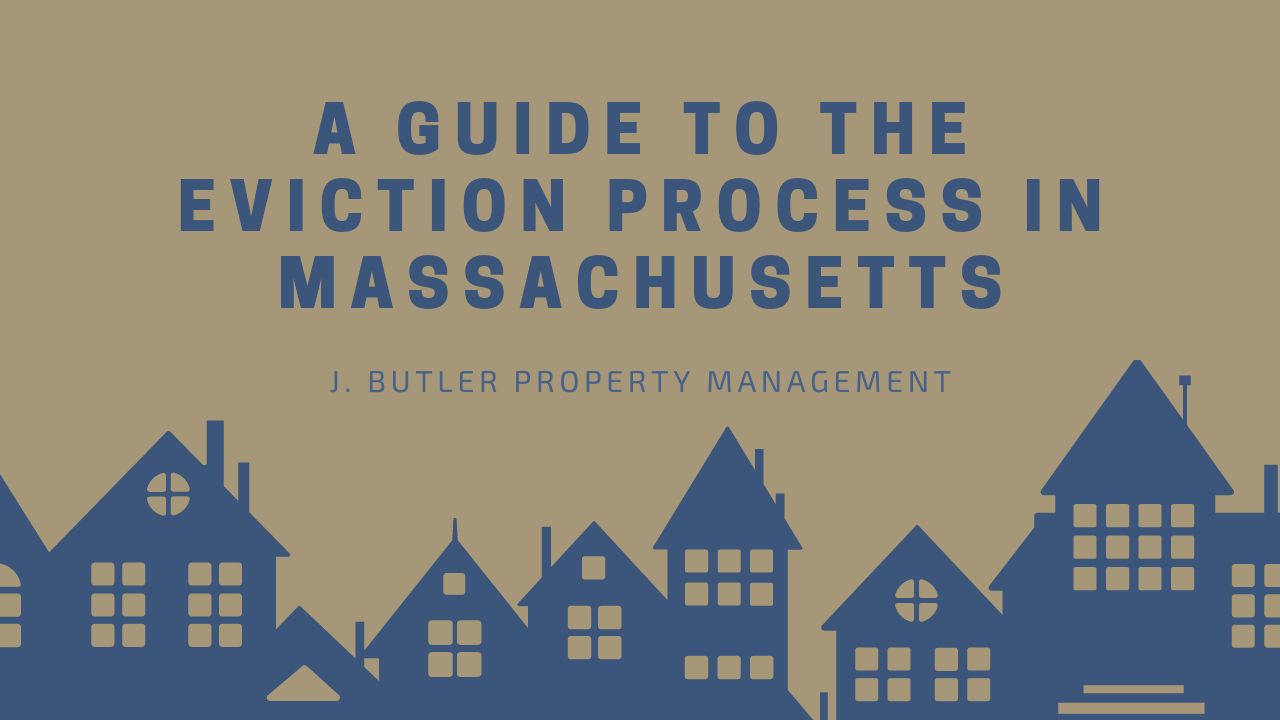
A Guide to the Eviction Process in Massachusetts
June 19, 2023
A Guide to the Eviction Process in Massachusetts
Owning a rental property can help you grow your income and wealth over time. However, even the most seasoned landlords have had to deal with problematic tenants. Sometimes, tenant-related issues escalate to the point of warranting an eviction.
Evicting a tenant is one of the biggest challenges any landlord can face. Not only is it a stressful experience, but it can also consume most of your free time and energy. That’s why it’s essential to understand the eviction process.
In this article, the experts at J. Butler Property Management will go over everything you should know about the eviction process in Massachusetts. Whether you are looking to evict a tenant or are simply familiarizing yourself with the Massachusetts eviction laws, we’ve got you covered!
A Guide to the Eviction Process in Massachusetts
All evictions follow the same process. First, the landlord serves a written notice to the tenants. If unresolved, the landlord then has to file a complaint in court. What follows are a series of court hearings until a judgment is issued. If the process is successful, a writ of execution is then issued and possession of the property is returned to the landlord.
Notice for Lease Termination with Legal Cause
In Massachusetts, evicting a tenant without a valid cause is illegal. However, a landlord can lawfully evict a renter for the following reasons:
- – Nonpayment of rent
- – Lease violations
- – End of lease/ no lease
- – Illegal Activity

Serving a Tenant an Eviction Notice
A landlord can’t evict a tenant without first serving them an eviction notice. The type of notice used is determined by the reason for the termination of the lease. Generally, there are three types of eviction notices given in Massachusetts:
1. Eviction for Nonpayment of Rent
According to Massachusetts landlord-tenant laws, rent is considered late if it’s not paid the day after it’s due. However, landlords can’t assess late fees or charge interest on unpaid rent until 30 days after the rent was due. If the problem can’t be resolved, landlords must start by serving a 14-day notice to vacate the premises.
2. Eviction for No Lease or End of Lease
A landlord in Massachusetts can evict a tenant with an expired lease or if they don’t have a lease. To do so, they have to terminate the tenancy by giving written notice to move out. In this case, the landlord must provide a 30-day notice to vacate the rental property.
3. Eviction for Violation of Lease or Responsibilities
Landlords in Massachusetts can evict tenants for violating the lease agreement, conducting illegal activity on the property, or failing to uphold their responsibilities. Landlords aren’t required to let tenants cure these violations and should only provide them with 7 days’ notice to vacate.

Massachusetts law doesn’t specify the exact method to serve a tenant with notice. However, to be effective, you must be sure that the tenant received it. That’s why it’s highly advised to hand-deliver the notice or have a constable or sheriff do it.
Tenant Eviction Defenses in Massachusetts
The defense is a reason why you (the petitioner) shouldn’t win the case. In Massachusetts, a tenant can have a defense for the following reasons:
- – They received an invalid notice to quit
- – Their landlord accepted rent after sending a notice to quit
- – They received a 14-day notice to quit for non-payment of rent when they weren’t behind on rent
- – They paid or offered to pay the landlord the rent owed within the time allowed by law
Filing a Complaint and Attending the Court Hearing
Once you’ve handed an eviction notice to your tenant, you must file a complaint in court. Then, a sheriff or a person appointed by the court will serve the tenant a copy of the summons and the complaint in the next 7 to 30 following days.
Then, you’ll have to attend the court hearing. If the tenant fails to appear for the hearing, the judicial officer will issue a default judgment in favor of the landlord. On the other hand, if the landlord fails to attend the hearing, but the tenant does, the hearing will be postponed for seven days.

Writ of Restitution
Once a judge rules in favor of the landlord, a writ of execution is issued. The writ of execution is the tenant’s final notice to leave the rental unit and allows them the opportunity to remove their belongings before being forcibly removed from the property.
In Massachusetts, the writ is typically issued 10 days after the date of the entry of judgment. However, it cannot be delivered to tenants on weekends, holidays, after 5 p.m. on a weekday, or before 9 a.m. on a weekday.
The Eviction
In Massachusetts, only sheriffs and constables are allowed to remove a tenant from your rental. Tenants are given 48 hours to vacate the rental property before they are forcibly removed.
Bottom Line
Dealing with problematic tenants is one of the most challenging aspects of being a landlord. To keep yourself and your property safe, it’s best to stay informed of the legal eviction process, as well as landlord-tenant, lease termination policies, and security deposit laws in your state. Now you have a better understanding of the eviction process in Massachusetts, you’ll know how to act in case you might need to deal with a bad renter.
While you can handle the eviction process by yourself, it’s best to work with a professional, whether it’s a qualified attorney or a knowledgeable property manager. Contact J. Butler Property Management today if you want help managing your rental properties!
Disclaimer: This blog isn’t intended to be a substitute for professional legal advice. Laws change and this information may become obsolete at the time you read it. For further help, please get in touch with a qualified attorney or an experienced property management company.


